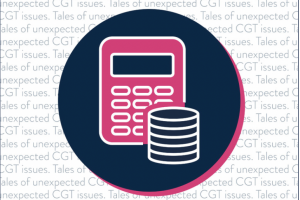14th March 2023
Illustration of ‘unexpected Capital Gains Tax issues’ arising…

Once, a divorced mother made a Will leaving her estate to her children. The house was her main asset. She died some years back and her Will was probated. The house was registered in the names of the adult children at the Land Registry. One of them moved in, with the other’s agreement.
Years later, the divorced dad also died. His Will, amongst other things left residue including his house to his same adult children. The other child was already living with their dad on the date of death and wished to remain living there.
The children wished to have one property each, so each proposed to give up the interest each had in the property the other lived in.
Whilst this presented as a conveyancing issue, it became clear that there were taxation issues at stake as well.
Now, as each separate transfer was for ‘no financial consideration’, stamp duty land tax was not an issue, although Land Registry fees would be but are not extensive.
But each of the children in fact had a capital gains tax (CGT) issue arising from the release of the interest in the other’s home.
Why? Because at no time had it been, in fact, their own principal main residence, as they lived in their own home, and one cannot have two main residences at the same time. An election, for it to be treated as ’Principal Main Residence’ (‘pmr’) will not really assist, given that the backward shadow of the deemed ‘pmr’ is far less extensive now than it has been in the past.
Now, depending on things like marital status, there are options to mitigate the CGT occasioned by the release, such as inter-spouse transfers to access an additional annual CGT allowance. But with the ‘shortly-to-be-with-us’ reduction in the value of the annual CGT allowance, the mitigation this provides will lessen significantly, and by tax year 23-24 will be even more restricted.
So, what are the take-away conclusions?
- If you have a potential CGT issue like this or indeed any likely gain on ‘disposal’, if you can trigger this, this side of the tax year and you have your full CGT allowance, give urgent consideration to getting that ‘done’ now.
- If you have a property-based CGT issue like this, seek advice with a view to doing something about it, given that over time property values have steadily increased, that means the longer you delay, the larger the likely CGT bill on any unscrambling.
However, do remember that at present, we have what is termed ‘CGT uplift’ on death.
So, if the person with the latent CGT problem is content to stay with the share of the other’s home in their hands until the date of their own death, then the CGT issue will be wiped clean on their death.
But care is needed with that, because in turn the asset could pass by the deceased’s Will or intestacy, to a person other than the person whose home it is; and/or we may have instead an inheritance tax bill in place of a CGT bill. Although the CGT is only on any gain element (and currently is at a lesser rate than the rate for chargeable IHT), IHT is at a higher rate and is potentially on the gain element and the original base value element as well. In the case of the former issue, a proper review as to whether the Will of the person holding an interest in another’s house adequately deals with that is advisable.
All of this demonstrates that these are issues to be looked at with the assistance of tax compliance experts (Accountants), who calculate and complete CGT returns, and Solicitors, who can deal with both the conveyancing and the mitigation strategies, as well as reviewing Wills.
For more information on the issues raised above where solicitors can assist, please contact our Edward Walter on 01892 502320, or by email, ewalter@bussmurton.co.uk.
